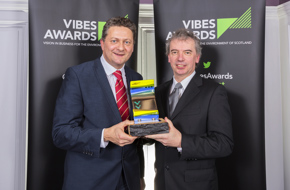Highlights
- Provides viable disposal route for the by-product of one of Scotland’s largest and important industries
- Potential to produce valuable products on a large scale, in a sustainable manner
- By developing a biofuel as a direct replacement for petrol the process will bring environmental benefits including carbon emissions savings, fossil fuels savings, and savings on the use of land for biofuel production
- Innovative patented process that can produce biobutanol as the key product but also acetone and high grade animal feed
- Potential market value for the business in the UK has been estimated in excess of £100 million per annum
- Partnership with Tullibardine Distillery and the Bio Base Europe Pilot Plant in Belgium to test the process on the industrial scale

Celtic Renewables, based in Edinburgh, is commercialising the production of biobutanol as an advanced biofuel from the copious residues of Scotland’s £4-billion malt whisky industry.
The VIBES Environmental Product or Service Award recognises businesses that have developed, or are developing, a product or service. The category is aimed at businesses that can demonstrate how products and services can promote sustainable consumption, reduce environmental impacts and create new business opportunities.
The VIBES judges were impressed with the potential for significant profit and expansion for this business. It was recognised that the company is at the early stages with plans for the first demonstration facility in progress. The commendation award for Celtic Renewables is in recognition of the potential environmental, social and economic benefits that this process could achieve for Scotland.
Celtic Renewables is a company committed to developing products based on a sustainable goal i.e. how to make biobutanol from ‘waste’ products, the commitment from the directors and the staff for this goal was clear to see.
This innovative, patented process uses by-products of the whisky industry to produce biobutanol, bioethanol, acetone and high grade animal feed, which are all products of commercial value.
The Company has been active in promoting their process and product, finding support and establishing partnerships including being adopted as a client by the Scottish Enterprise High Growth Startup Unit. The judges were particularly impressed, that for a small company, the business were actively involved in promoting their ideas; recent articles in National Geographic, Financial Times and across the TV (including BBC, Sky, Nippon TV, CNN, France 24, ZDF, CCTC-China and European Parliament TV) demonstrate the global interest in this process. They have also spoken at various seminars and workshops.
The judges were provided with an example of an impressive environmental benefit from one of the targeted sites for the first production plant i.e. the island of Islay where there are 8 whisky distilleries. The local impact there for both carbon emissions and energy security are huge. The conversion of all the distillery by-products would produce over 2 million litres of biofuel, which is the equivalent of the current consumption of petrol and diesel on the island. This would make the island self-sufficient for road transport fuel. This is equivalent to a reduction of 13,000 tonnes of CO2 per annum, which is the equivalent of over 3 tonnes per person living on the island.
The judges were impressed with the replication potential and the future plans of the business. The company have a 3 years business plan and clear ideas of expansion from their current status to industrial implementation, first in Scotland and then also abroad.
A longer-term objective is to adapt the process to other novel abundant biological waste streams and expand on this, using materials, now considered as wastes, to bring environmental and sustainability benefits to those areas.
The judges felt that the company is an excellent example of a process being provided to enhance sustainability, address fuel poverty and turn waste products into a viable source of renewable energy. The benefits of the product are recognised both locally and globally.